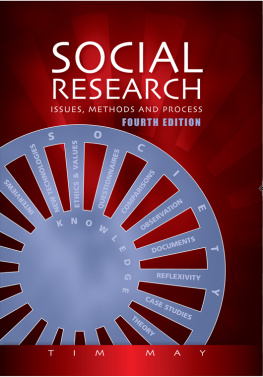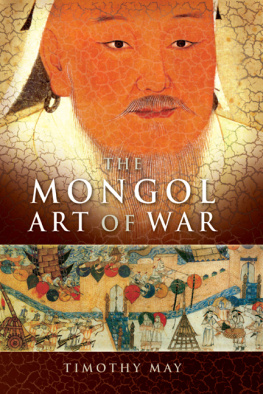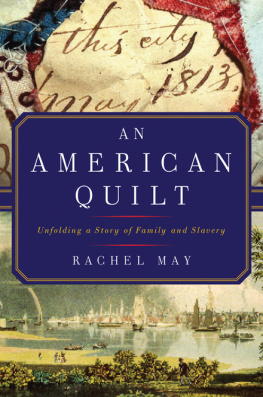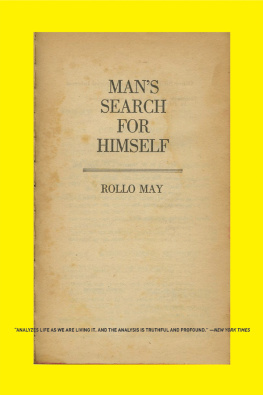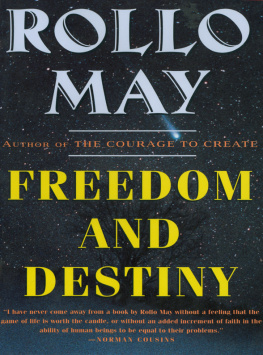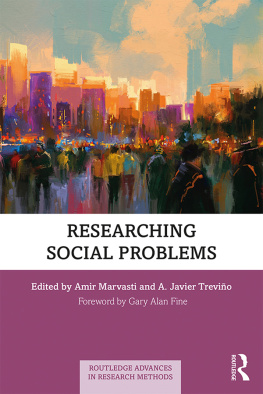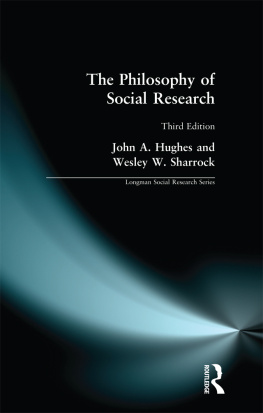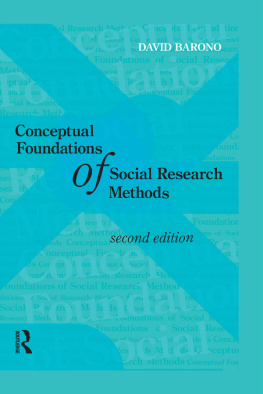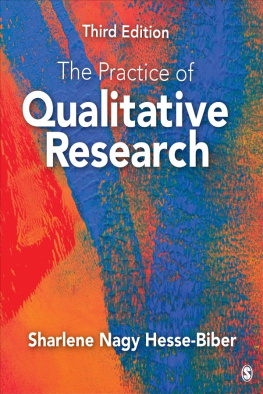May - Social Research
Here you can read online May - Social Research full text of the book (entire story) in english for free. Download pdf and epub, get meaning, cover and reviews about this ebook. City: Maidenhead, year: 2011, publisher: McGraw-Hill International (UK) Ltd;Open University Press, genre: Politics. Description of the work, (preface) as well as reviews are available. Best literature library LitArk.com created for fans of good reading and offers a wide selection of genres:
Romance novel
Science fiction
Adventure
Detective
Science
History
Home and family
Prose
Art
Politics
Computer
Non-fiction
Religion
Business
Children
Humor
Choose a favorite category and find really read worthwhile books. Enjoy immersion in the world of imagination, feel the emotions of the characters or learn something new for yourself, make an fascinating discovery.
Social Research: summary, description and annotation
We offer to read an annotation, description, summary or preface (depends on what the author of the book "Social Research" wrote himself). If you haven't found the necessary information about the book — write in the comments, we will try to find it.
May: author's other books
Who wrote Social Research? Find out the surname, the name of the author of the book and a list of all author's works by series.
Social Research — read online for free the complete book (whole text) full work
Below is the text of the book, divided by pages. System saving the place of the last page read, allows you to conveniently read the book "Social Research" online for free, without having to search again every time where you left off. Put a bookmark, and you can go to the page where you finished reading at any time.
Font size:
Interval:
Bookmark:
Open University Press
McGraw-Hill Education
McGraw-Hill House
Shoppenhangers Road
Maidenhead
Berkshire
England
SL6 2QL
email: enquiries@openup.co.uk
world wide web: www.openup.co.uk
and Two Penn Plaza, New York, NY 10121-2289, USA
First published 1993
Second edition published 1997
Third edition published 2001
Reprinted 2003, 2004, 2005, 2006 (twice), 2007, 2008, 2010
First published in this fourth edition 2011
Copyright Tim May, 2011
All rights reserved. Except for the quotation of short passages for the purposes of criticism and review, no part of this publication may be reproduced, stored in a retrieval system, or transmitted, in any form or by any means, electronic, mechanical, photocopying, recording or otherwise, without the prior written permission of the publisher or a licence from the Copyright Licensing Agency Limited. Details of such licences (for reprographic reproduction) may be obtained from the Copyright Licensing Agency Ltd of Saffron House, 6=N10 Kirby Street, London, EC1N 8TS.
A catalogue record of this book is available from the British Library
ISBN-13: 978-0-33-523567-4
ISBN-10: 0-33-523567-0
e-ISBN: 978-0-33-523998-6
Library of Congress Cataloging-in-Publication Data
CIP data applied for
Typeset by RefineCatch Limited, Bungay, Suffolk
Printed in the UK by Bell & Bain Ltd, Glasgow
Fictitious names of companies, products, people, characters and/or data that may be used herein (in case studies or in examples) are not intended to represent any real individual, company, product or event.
There are a number of people I would like to thank who have been sources of friendship and support during the writing process.
At SURF, my thanks go to Simon Marvin and Mike Hodson for the support and to Matt Thompson and Vicky Simpson for their assistance. Beth Perry and I have worked together on many projects that have involved comparative research and case studies. It thus made perfect sense to ask Beth to co-author those chapters. My thanks to her for that and for reading the entire manuscript and suggesting positive change to its content.
Cian, Calum, Alex, Nick and Lewis remind me that there are many other things beside the world of work to preoccupy my time in so many different ways and their lives are a never-ending source of change, insight, experience and hope. My love and gratitude to Vikki for her support and for so many good times and for many more to come in our lives together.
Malcolm Williams, whom I asked in the production of the second edition to join me in writing the questionnaire chapter, took on new responsibilities which prevented him from contributing to this edition. I was, however, fortunate that Carole Sutton, who is an experienced quantitative researcher and author, agreed to co-author that chapter and my thanks to her.
Finally, my thanks to Ken Parsons for his friendship and the editorial and production teams at Open University Press/McGraw-Hill and to Christine Firth for her excellent copy-editing skills.
I was very pleased to learn that this book has been so successful as to warrant a second edition. Many people have been very supportive in their comments and letters regarding its aims, structure, style and content. Students, lecturers and researchers alike found the book to be accessible and comprehensive. It was therefore with some trepidation that I approached the writing of a second edition.
This book, as with all books, has its limitations, as well as strengths. However, when it came to taking critical comments onboard in an attempt to rectify any shortcomings, published reviews, while complimentary, were mixed in relation to its intended audience. All agreed that it was aimed at undergraduates, but noted that it was suitable for postgraduates. I also found that while lecturers were defining it as a textbook, they were often consulting it in order to update themselves on current thinking, as well as quoting from it to justify or expand upon their own investigations.
With these messages in mind, where was I to start? In the end I decided that the structure of the book should remain intact and it can be read at different levels. What I thought was required were additions to the content of each chapter in order to render further justice to ideas on the research process in general, as well as aspects of its practice in particular. Given this decision, all chapters have been revised and expanded and I have added suggested further readings to the end of each chapter.
When it came to the chapter on questionnaires, it is now five years since I have undertaken, first-hand, survey research through the stages of design, administration and analysis. This does not reflect so much a methodological preference, but the ebbs and flows to which one is subjected in the first years of an academic career, as well as the costs associated with large-scale survey research. Quite simply, you are not in a position to refuse opportunities that come your way and these have involved more qualitative aspects of research practice. Thus, although I have acted in an advisory capacity on survey research projects, Malcolm Williams, an experienced quantitative researcher and friend with whom I have worked on several occasions, kindly agreed to assist me in expanding and updating that chapter.
Overall, the end result is a new edition which takes into consideration recent developments in the field of social research. In so doing it is hoped that readers find it as accessible and comprehensive as the first edition and it renders further justice to a rich and varied field of perspectives and practices. Its basic philosophy, however, remains the same: that is, reflexive researchers will produce the most insightful research into the social worlds which we inhabit, while the social sciences are central for understanding social relations and explaining the workings of societies in general.
When this book was first published in 1993, it was my belief that it could fill a gap in the literature on social research. It aimed to do this by bringing together, in one volume, a discussion of the issues, methods and processes of social research. While it could never be exhaustive and I was very uncertain whether it would be successful it was, contrary to the expectations of those few persons who sought to support my endeavours by telling me that there were plenty of books already on the market, a success. Then, with the publication of a second edition and following substantial revision, sales increased even further and I received communications from people who were very complimentary and supportive of the book. Now, as I write the third edition, I am delighted that people still find it a book worth reading.
As with the second edition, I approached the revision of this book with some trepidation. After all, the structure and content clearly appeal to a wide audience, with varying degrees of research experience, across a range of disciplines. At the same time, it is necessary that its content reflects the developments that have occurred within the interdisciplinary field of social research. Given this, I have undertaken a number of revisions to reflect these changes.
In the first part of the book, revisions and additions have been made in order to reflect new ways of thinking about the relationship between theory and research and values and ethics in the research process. This takes onboard advances in post-empiricist thinking, as well as the relations between values, objectivity and data collection. Also, where necessary, recommended readings have been updated, as well as references to studies that form the basis of discussions throughout the book. With the valuable help of my friend and colleague, Malcolm Williams, additions have been made to the chapter on questionnaires (a method that, since the second edition, I have again utilized in employing what is known as Delphi-style questionnaires), while discussions on research on the internet, narratives, case studies and new technologies, among others, have been introduced in the second part of the book. The reader will also detect many other changes, the intention of which is to aid understanding by keeping up-to-date with the latest innovations in social research.
Next pageFont size:
Interval:
Bookmark:
Similar books «Social Research»
Look at similar books to Social Research. We have selected literature similar in name and meaning in the hope of providing readers with more options to find new, interesting, not yet read works.
Discussion, reviews of the book Social Research and just readers' own opinions. Leave your comments, write what you think about the work, its meaning or the main characters. Specify what exactly you liked and what you didn't like, and why you think so.

